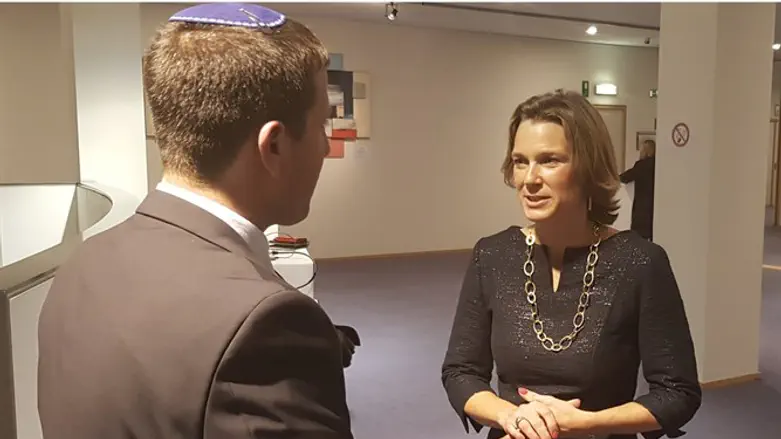
Arutz Sheva spoke in Brussels with the EU’s Coordinator for fighting Anti-Semitism, Katharina von Schnurbein, amid events at the European Parliament marking International Holocaust Remembrance Day.
Schnurbein addressed efforts being made to combat the anti-Semitic reality in Europe. “We see that anti-Semitism is unfortunately very much alive in Europe. We are taking measures, we are talking to the member states about security, about education, about law enforcement, about taking down online hatred.”
“One has to be aware, though, that anti-Semitism has been around for two thousand years, so it’s not going away very quickly. We have to have very long breath, but we also have very strong determination.”
Addressing Knesset Speaker Yuli Edelstein’s criticism of Europe’s hypocritical condemnation of anti-Semitism even at it embraces Hamas, Schnurbein said that “Regarding what is and is not legitimate criticism of Israel, we have the definition adopted by the International Holocaust Remembrance Alliance that was also adopted by the European Parliament and which the European Commission has endorsed, and there, it is very clear that criticism of Israel, like that of other countries, is legitimate, but that doubting the legitimacy of the State of Israel and Jewish self-determination, is not, and is anti-Semitic. Therefore, I think it’s very important to be aware and to use this definition as a guide. It’s not legally binding, but can also be used, for example, with respect to education, law enforcement, state authorities. So we are working on all these aspects with the responsible parties in the member states.”
Asked whether she thought that political correctness posed a problem in the ability to fight anti-Semitism in the Muslim community, Schnurbein emphasized that “It’s very clear that we should not generalize and stigmatize the whole community, but we have to be clear that terror has no room in Europe.”
Schnurbein said that International Holocaust Remembrance Day was “always one of the most difficult days of the year. Because you see where this hatred and systematic killing has led. We at the European Commission do a staff training on the role of civil servants in bringing about the Holocaust. So in the end, normal people reached that degree of action, and this is something we have to remember every year and it’s important to keep this remembrance especially for the younger generation. Remembering the Holocaust does not immunize you against anti-Semitism, but it is certainly one important tool to work against it.”
“That’s why it’s also so important with respect to the migrant population to find ways to explain to them what has happened in Europe, and how on the ashes of the Holocaust we built a Europe of democracy with the rule of law that is on the side of the victims now and not instigating racism. So we have really changed the continent in the last 75 years, and it is important to see where we have come from.
“Of course we still have to continue to build and correct, but it’s important to see that a strong democracy can face these issues.”
